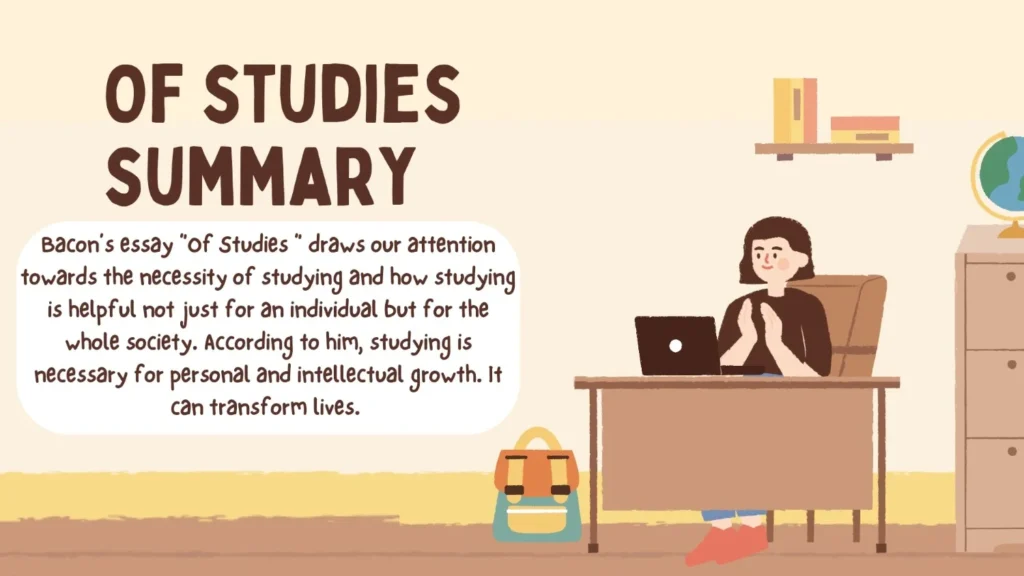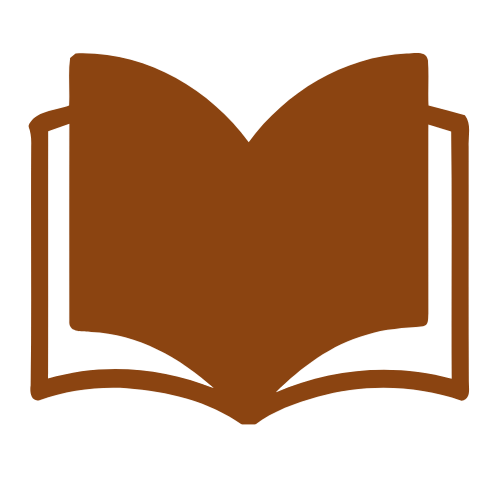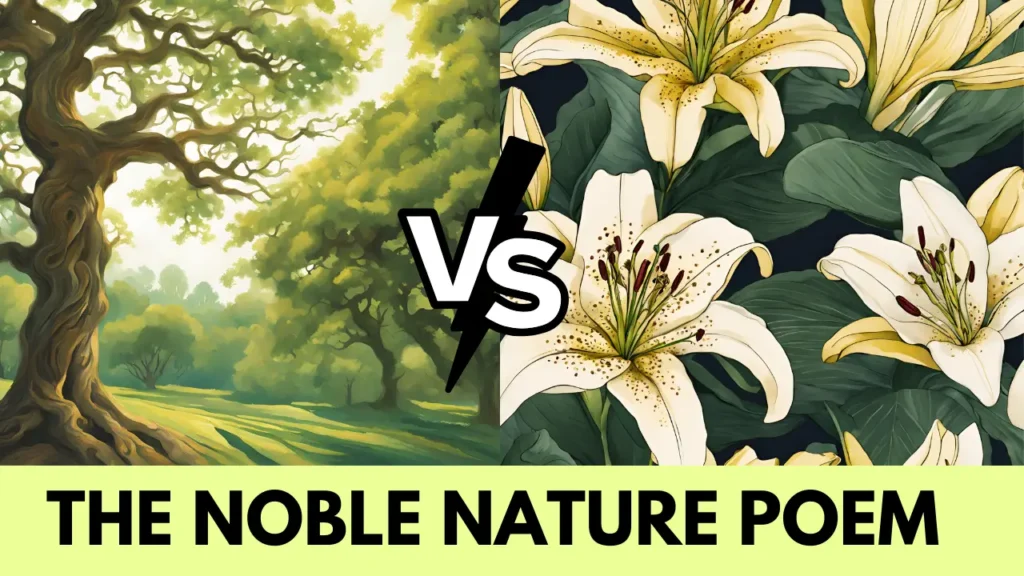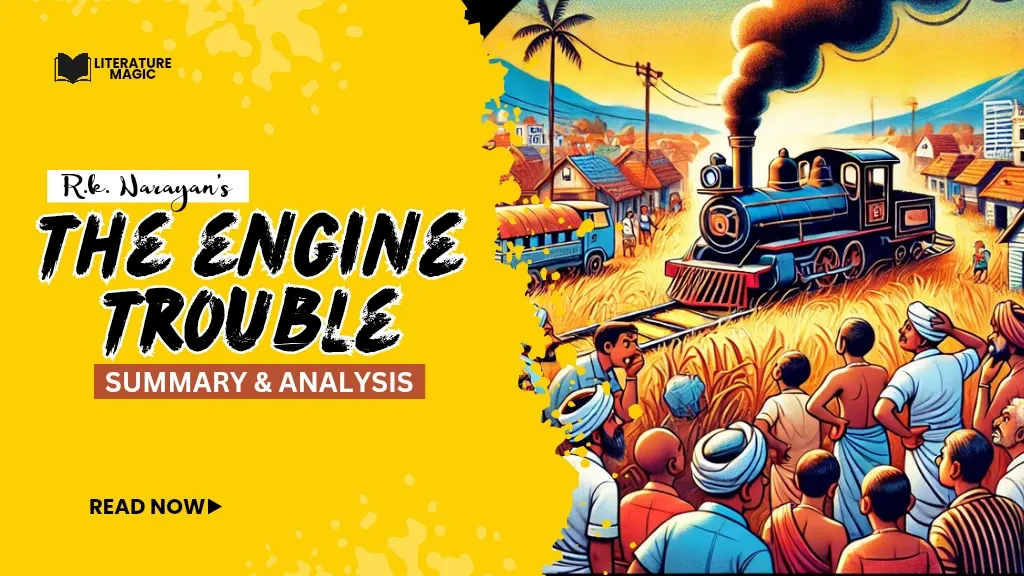Hi literary magicians, in this article, I’ll try to present before you the summary and analysis of ‘OF Studies’ by Francis Bacon in easy language. Please leave us feedback so that we can improve our content.
About the Poet

Francis Bacon (1561-1626) was an English philosopher, statesman, scientist, and author who is credited with developing the empirical method, which laid the groundwork for modern scientific inquiry. He served as Attorney General and Lord Chancellor of England. Bacon’s writings strongly denote the importance of observation and experimentation.
His famous works are:-
- Novum Organum
- The Advancement of Learning
- Essays
- The New Atlantis
- The Great Instauration
Analysis of Of Studies by Francis Bacon
Bacon’s essay “Of Studies ” draws our attention towards the necessity of studying and how studying is helpful not just for an individual but for the whole society. According to him, studying is necessary for personal and intellectual growth. It can transform lives.
This reminds me of the famous quotation by Nelson Mandela :
“Education is the most powerful weapon which you can use to change the world”
– Nelson Mandela
Purpose of studying
According to Bacon, studying serves three main functions: to delight, to enable, and to adorn(ornament).
1. Delight: Bacon tells us that studying gives you the same pleasure that you get from pursuing a hobby or any artistic endeavor. Also, this happiness is not just superficial but deep. He explains that when people engage in studying, they experience intellectual satisfaction that is more profound than the pleasure received through any other entertainment.
2. Adorn: Another role of studying is to ornament or enhance one personal and social presence. Knowledge polishes a person’s character and adds a layer of sophistication to it. A well-read person is often admired for his insights and his ability to hold engaging conversations. Their thoughts are mostly backed by facts and figures. This makes them respectable in society.
3. Enable: Bacon also says that studying enables a person with the tools they need to succeed in various aspects of life. Knowledge gained through studies can be applied practically to solve problems and make informed decisions. It also helps in achieving one’s personal and professional goals. For example, studying a particular field can either help someone excel in his career or help them manage everyday challenges more effectively.
Types of Knowledge and Their Uses
Bacon divides knowledge into three types based on its uses:
1. Practical Application: Some studies are directly applicable to real-world situations. It can have a powerful impact on society. For instance, studying medicine is essential for diagnosing and treating illnesses. We can say, here, that it is studying which makes a normal individual equivalent to God. Also, we are now on moon and exploring life on other planets, could you imagine such innovations without studying?
2. Intellectual Enjoyment: This kind of studying is pursued for pleasure without immediate practical application. These includes philosophical or theoretical subjects. This kind of study enriches the mind and spirit, offering a sense of fulfillment and a deeper understanding of life. For instance, a course on spirituality might not have an immediate practical application but it gives you peace of mind and joy.
3. Character Development: Bacon also notes that some studies refine and improve a person’s character. Philosophical and ethical studies not only leads to personal growth and moral development but also helps spread positivity in the society. By exploring concepts of virtue, justice, and human nature, individuals develop a more thoughtful and principled approach to life.
Balancing Study with Practical Experience
In the essay “Of Studies ” by Francis bacon, while Bacon acknowledges that there are many benefits of studying, he also warns us about the potential downsides, if it is not balanced properly. Excessive focus on theoretical knowledge can lead individuals to neglect practical experiences and responsibilities. Bacon cautions against allowing the study to become an escape from real-world duties and interactions. He adds that while knowledge is valuable, it should complement practical experience rather than replacing it.
Different Approaches to Studying according to the essay “Of studies” by Francis Bacon
Bacon highlights that all studies do not require the same approach. Some subjects need deep and concentrated study, while others might be better approached with a more general or casual attitude. This shows the diversity of knowledge and how different fields or topics can be engaged in various ways. For example, studying a technical subject like physics might require intense focus and detailed understanding, whereas reading literature might be approached with broader, more relaxed engagement.
The Importance of Critical Thinking
Critical thinking is another crucial aspect of Bacon’s perspective on studying. He believes that simply acquiring knowledge is not enough; one must also engage with it thoughtfully and analytically. Bacon advocates for a reflective approach to learning, where individuals not only absorb information but also question and critically evaluate it. This deeper engagement helps in gaining a more nuanced understanding and applying knowledge more effectively.
The Role of Studies in Personal Development
Bacon’s essay also touches on how studying contributes to personal development. By broadening one’s perspective and deepening one’s understanding, studying can enhance wisdom and judgment. A well-rounded education helps individuals navigate various aspects of life with greater insight and maturity. This intellectual growth supports better decision-making and a more informed approach to life’s challenges.
The Social Benefits of Studying
In addition to personal development, Bacon acknowledges the social benefits of studying. A knowledgeable person is often more effective in social interactions, able to contribute meaningfully to discussions and engage with others on a range of topics. This social competence can improve relationships and open up opportunities for collaboration and advancement.
‘Of Studies’ by Francis Bacon Summary
If we summarize ‘Of Studies’ in few lines, Bacon believed that studying is like a medicine for the mind, curing it of ignorance, confusion, and all the unhealthy thoughts. Just as physical medicine can heal a sick body, learning can help us clear up the “sickness” of the mind. It sharpens our thinking and helps us make better decisions. Bacon thought that by reading and learning, we can overcome doubts, misunderstandings, and wrong ideas, which are like diseases to our thinking. It’s through education that our minds grow strong and healthy. It can also improve our ability to understand the world and make sense of complex situations.
Additionally, Bacon saw studying as a powerful tool for purifying our thoughts, almost like a cleanser that removes superstitions, myths, and false beliefs. He believed that knowledge, based on facts and evidence can help us clear away the fog of old, unproven ideas that have held back progress. Just as a cleaning agent makes things shine by removing dirt, studying cleanses our minds from outdated and irrational beliefs. It pushes us toward a more enlightened way of thinking, where we rely on reasoning and evidence rather than fear or superstition.

Read a fresh article on the short summary of “Of Studies by Francis Bacon” by clicking here.
Conclusion
In conclusion, Bacon’s essay “Of Studies” presents a comprehensive view of the role of learning in human life. He celebrates the pleasure, enhancement, and practical benefits of studying while also cautioning against the pitfalls of excessive or unbalanced focus. Bacon’s insights encourage a balanced approach to education, where intellectual pursuits are complemented by practical experience and critical thinking. By understanding and applying these principles, individuals can maximize the benefits of their studies and contribute positively to both their personal growth and society.
Original Text/Excerpt of “Of Studies” by Francis Bacon
"Studies serve for delight, for ornament, and for ability. Their chief use for delight, is in privateness and retiring; for ornament, is in discourse; and for ability, is in the judgement and disposition of business. For expert men can execute, and perhaps judge of particulars, one by one; but the general counsels, and the plots and marshalling of affairs, come best from those that are learned. To spend too much time in studies is sloth; to use them too much for ornament, is affectation; to make judgement wholly by their rules, is the humour of a scholar.
They perfect nature, and are perfected by experience: for natural abilities are like natural plants that need proyning by study; and studies themselves do give forth directions too much at large, except they be bounded in by experience. Crafty men contemn studies, simple men admire them, and wise men use them; for they teach not their own use; but that is a wisdom without them, and above them, won by observation.
Read not to contradict and confute; nor to believe and take for granted; nor to find talk and discourse; but to weigh and consider. Some books are to be taste, others to be swallowed, and some few to be chewed and digested; that is, some books are to be read only in parts; others to be read, but not curiously; and some few to be read wholly, and with diligence and attention. Some books also may be read by deputy, and extracts made of them by others; but that would be only in the less important arguments, and the meaner sort books; else distilled books are like common distilled waters, flashy things. Reading maketh a full man; conference a read man; and writing an exact man.
And therefore, if a man write little, he had need have a great memory; if he confer little, he had need a present wit and if he read little, he had need have much cunning, to seem to know that he doth not. Histories make men wise; poets witty; the mathematics subtile; natural philosophy deep; moral grave; logic and rhetoric able to contend. Abeunt Studia in mores: [Studies pass into character.] Nay there is no stond on impediment in the wit, but may be wrought out by fit studies: like as disease of the body may have appropriate exercises. Bowling is good for the stone and reins; shooting for the lungs and breast; gentle walking for the stomach; riding for the head; and the like. So f a man’s wit be wandering, let him study the mathematics; for in demonstrations, if his wit be called away never so little, he must begin again. If his wit be not apt to distinguish or find differences, let him study the schoolmen; for they are cymini sectors. If he be not apt to beat over matters, and to call up one thing to prove and illustrate another, let him study the lawyers’ cases. So every defect of the mind may have a special receipt."
Download Notes
If you want to download the content and keep it offline, click the download button below


